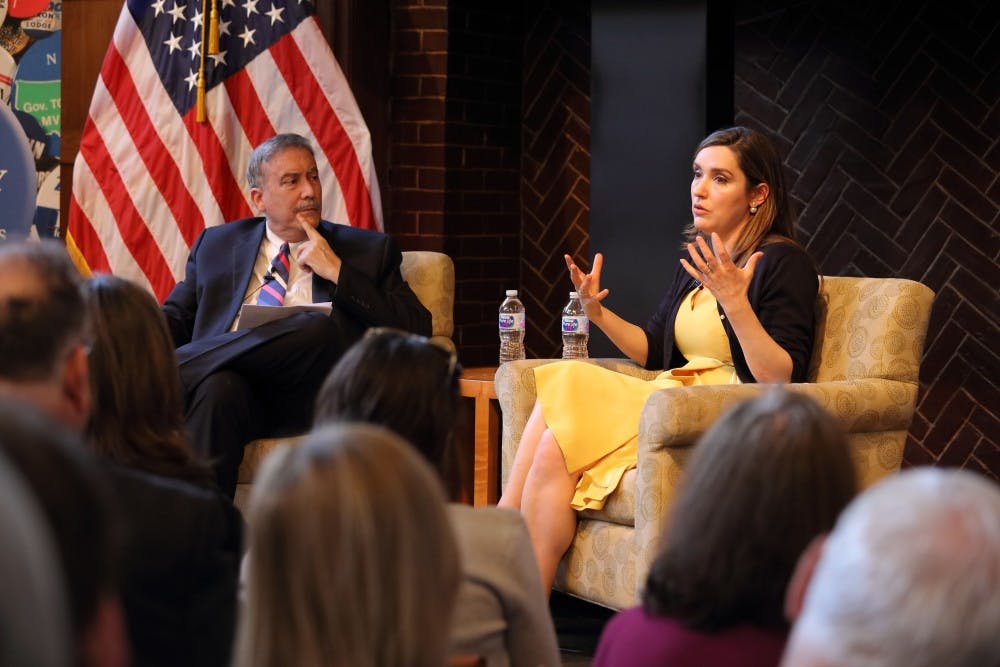Margaret Brennan, a 2002 University graduate and moderator of CBS’s Face the Nation, spoke to a crowd of more than 170 students, faculty and community members in Garrett Hall Wednesday evening as a part of the Batten School and the Center for Politics’ “Democracy in Perilous Times” series. Brennan talked about her career as a journalist and her experiences prominently covering the White House and hosting a broadcast news program during the Trump administration.
The event began with a brief discussion between Brennan and Larry Sabato, Center for Politics director and professor of politics, followed by an opening of the floor to questions from the audience. Sabato provided an introduction to Brennan’s life and career. After studying foreign affairs, Middle Eastern studies, and Arabic while at the University, Brennan began working for CNBC covering Wall Street, later moving to Bloomberg Television to continue her financial reporting as an anchor. She joined CBS in 2012 as a White House correspondent and became the moderator of Face the Nation in February 2018.
Brennan said the expertise she gained studying and covering these specific issues have shaped the way approaches her current journalistic work.
“I covered Wall Street for a decade,” Brennan said. “And Wall Street is shorthand for how the world functions often … so I brought that and I brought my background covering national security policy, and those are things that are often on my front burner and headlines that catch my attention.”
In her talk, Brennan noted the fast-paced nature of a television newsroom and explained the process of booking political figures for the Face the Nation broadcast, which airs Sunday mornings. Trump and his cabinet are usually more eager to appear on Sunday news programs than past administrations, according to Brennan. Earlier this year, Brennan notably spoke with Trump on Face the Nation, and she shared how she navigates interactions with difficult interview subjects.
“You wonder how much the viewer is perceiving your interjection as interruption,” Brennan said. An interjection to interject a fact … is I think is our responsibility. That’s different than just shouting over, which is not what I do — that’s not my style.”
Brennan also discussed her experience as the only female anchor among the range of Sunday news programs. She noted that Lesley Stahl, who moderated Face the Nation in the 1980s, was the first woman anchor on CBS — Brennan herself is only the second.
Issues of representation across race and gender have been prevalent in the field of broadcast journalism, and much of Brennan and Sabato’s discussion and a few questions from the audience centered around this topic. Brennan said that she believes the industry is undergoing significant changes to ensure that its coverage and the individuals who deliver it are more diverse.
“We try to make Face the Nation look like the nation,” Brennan said. “We try to incorporate more diversity of thought and perspective … People ask you these big picture questions of what things have changed, and I think that the storytellers have also changed. I think perspectives need to be more informed as well. You can’t just have the same point of view reflected and repeated all the time.”
When an audience member asked what a news organization’s responsibility is in response to claims of fake news, Brennan described the dual responsibility of news outlets to provide accurate, comprehensive coverage and of media consumers to carefully choose which sources to watch, listen to and read.
“We’re talking about the state of democracy and the press, and I think there’s a lot of emotion right now, and I think it’s really important to have context,” Brennan said. “So pay attention to that. Don’t just watch the soundbite, watch the interview. Read the paper and watch the news. Read the story before you retweet it.”
Third-year College student John Dour attended the event because he wanted to learn about the issues facing the news industry from a prominent journalist with University ties, and he said that he finds Brennan’s direct style of interviewing refreshing.
“Her talk made me more cognizant of the need to look for members of the media who are informed with facts and utilize incisive lines of questioning,” Dour said. “I think it's critical as students to get past political rhetoric and reach the heart of the most pressing political and societal issues that need addressing.”
In an interview with The Cavalier Daily, Brennan said that her time at the University helped prepare her for her career in ways that she didn’t expect. Even though she didn’t study journalism, she believes the analytical skills she gained proved to be influential.
“I thought I was going to go into diplomacy,” Brennan said. “9/11 happened and all of a sudden my background became this asset in a different way. I was studying it because I loved it. And then I was looking at this idea of how to explain to people the roots of why things happen, the context for why things happen. In that era graduating in ‘02, I felt like news was a good way to put all that to work.”
Sabato said in an interview with The Cavalier Daily that he brought Brennan back to Grounds for this particular series about the dangers facing democracy because she represents a form of objective, informative media that the country needs in an era of heightened partisanship.
“People have gotten to the point where they want to hear their views reinforced,” Sabato said. “They do not want to be challenged, even by the facts, and that is worrisome, and it enables charlatans to get elected and maintain their power and increase their power. Because if they have the power of high office and they also have the ability to define their own facts, the country’s in trouble.”





